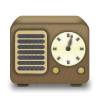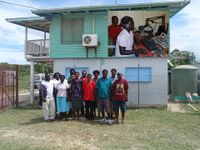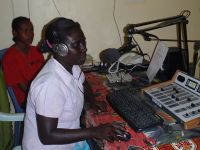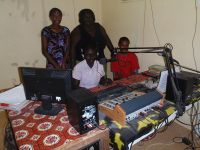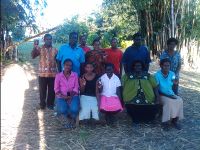Community Media/PNG/Bogenvil Meri Tede
Contents
- 1 Information about Bogenvil Meri Tede (BMT)
- 2 Information about New Dawn FM
- 3 Workshop on Introducing Mobiles into Community Learning, Buka, May 23-25, 2011
- 4 Resources
- 5 Workshop Outputs
- 6 Feedback and Information on progress
- 7 Contacts
Information about Bogenvil Meri Tede (BMT)
The Bogenvil Meri Tede (Bougainville Women Today) concept was developed at the programme design workshop held at the Kuri Village Resort, Buka Bougainville, PNG, 7-10 September 2010. It was organised by New Dawn FM in association with participation from the Ministry of Community Affairs, Bougainville Hospital, Bougainville Inter-Church Council, CARE International, NBC Bougainville, with sponsorship and training by the Commonwealth of Learning and the Regional Media Centre of the Secretariat of the Pacific Community.
BMT is a community learning programme focusing on women's health. The programme is under the COL's Healthly Communities. The detailed programme guide can be downloaded below, which features the message and programme matrices. The radio programmes have been produced and are currently being broadcast every Wednesday evening on New Dawn FM.
Download the BMT Programme Guide.
Information about New Dawn FM
The Beginnings of a New Dawn - the story of a community radio station
By Aloysius Laukai
We started talking about establishing a community radio station in Bougainville around 2000 and decided we would call it New Dawn FM to mark our optimism about the future of the Autonomous Province of Bougainville following a terrible civil war that left countless thousands of people dead, injured or internally displaced.
Initially, New Dawn FM broadcasts to the many towns and villages in the Tinputz and Buka Passage area of north Bougainville. The locally owned and managed radio station would not only provide an independent news, information, education and entertainment to listeners, but also be a model for the possible establishment of community radio stations elsewhere.
We believed the project would contribute to establishing a public sphere of community discourse, enabling discussion and giving a voice to a community dispossessed by civil insurrection and seeking to rebuild a democratic society.
The talk continued and reached a lunch table in Sydney, Australia, where our Board member Carolus Ketsimur met his old Papua New Guinea broadcasting buddies Phil Charley OAM and Keith Jackson AM. They sought the assistance of Assoc Prof Martin Hadlow of Queensland University, himself formerly a radio station manager in PNG and a senior UNESCO executive.
Together we developed a concept that saw UNESCO and the German Government provide funds for studio equipment and a transmitter. After a number of false starts, we finally started testing the station in April 2008. Then, at the end of June, our transmitter was destroyed when strong winds damaged the telescopic mast. We paid for another and a standby transmitter and went on back on air in November 2008.
We are now on air with a transmitter power of 300 watts. Since our establishment we have covered the Bougainville Presidential by-election and also the celebrations of the inauguration of the second Autonomous Bougainville Government. This was done in Arawa in Central Bougainville and we covered it live for listeners in the north.
The Government was very impressed and gave us budget support with initial funding of 50,000 kina, which will be increased later this year. We have so far secured more than ten sponsors for our programs who are paying K500 per program per month and still more are coming forward.
We get about 500 test messages a day for requests and other information from our listeners and this is very encouraging as they participate daily in our shows.
New Dawn blog site:
Workshop on Introducing Mobiles into Community Learning, Buka, May 23-25, 2011
This workshop is based on a module from the Toolkit developed by COL's Training division.
|
In this unit – part of the Integrating Mobile Telephones module – participants
|
|
Workshop Schedule
| Time | Activity | Description | Resources |
| 0830 | Check in and welcome | In a circle. Hand out K5 flex cards for all participants. State mobiles must be turned ON! Greetings – quick introduction/icebeaker – all state name and one like/dislike about one-self.
|
Flex cards
Announce resource CD will be made available |
| 0900 | Collect participant details | To get people interested and excited.
Register numbers with Frontline SMS keyword. Auto reply will send all the participants an SMS message introducing the workshop and reminding them of something (as an example of a logistical use of mobiles). Just check all have sent successfully - enter names into contacts during break.
|
Frontline SMS working,
whiteboard with number and keyword
Auto reply requests for email address If you can do a script, automatically extract names
|
| 0930 | Objectives and schedule | State purpose of workshop- Aim, Objectives, Outputs, Schedule
|
Slides |
| 0945 | Activity 1
Understanding how mobiles are used locally |
Group brainstorming (break into small groups if need be for demographics)
|
Whole group brainstorming
Volunteer from group shares task of marking up flip charts:
Slides on mobile revolution
|
| 1030 | Break | ||
| 1045
1200 |
Activity 2
Understanding how mobiles have been used to support learning for development in other places
|
Presentations with group brainstorming – in what ways can mobiles be used to support a learning programme?
|
Slides with elements
|
| Activity 3
Closer look at specific applications |
This is what we did in Buka:
Presentations with videos and examples
Phone-based application – Rapid Android and Quizee
Wi-Fi Broadcast system
GRINS
DAISY
Collaboration tools to support follow up
|
Show slides, discussion with reference to elements after each example
Android
Wi-Fi BS
DAISY
| |
| 1230 | Lunch | ||
| 130pm | Activity 3 | Complete demonstrations of mobile applications, requests, etc
|
|
| 2pm | Activity 4 Identify applications to try out in the local context
|
Group work, groups report back using market place (with extra time to prepare flip chart paper)
Report back using market place. Each group selects one person to act as the market trader. Prepare flip chart to illustrate.
|
Introductory slide
Try to group ideas emerging from around the following major headings:
|
Workshop Outputs
Activity 1 : How people use mobiles locally
Survey of mobile types used by participants
| |
|
|
|
|
|
|
|
|
|
|
|
|
| |
|
|
|
|
|
|
|
|
|
|
|
|
| |
|
|
|
|
|
|
|
|
|
|
|
|
| |
|
|
|
|
|
|
|
|
|
|
|
|
| |
|
|
|
|
|
|
|
|
|
|
|
|
| |
|
|
|
|
|
|
|
|
|
|
|
|
| |
|
|
|
|
|
|
|
|
|
|
|
|
| |
|
|
|
|
|
|
|
|
|
|
|
|
| |
|
|
|
|
|
|
|
|
|
|
|
|
| |
|
|
|
|
|
|
|
|
|
|
|
|
| |
|
|
|
|
|
|
|
|
|
|
|
|
| |
|
|
|
|
|
|
|
|
|
|
|
|
| |
|
|
|
|
|
|
|
|
|
|
|
|
| |
|
|
|
|
|
|
|
|
|
|
|
|
| |
|
|
|
|
|
|
|
|
|
|
|
|
Demographics, mobile usage in Bougainville
| Group | What do people use mobiles for?
|
What are the differences, advantages and disadvantages of mobiles over other means of communication? | How have mobiles changed things? | |
| Maria
Terese Fredrickah
|
Communication
Entertainment Information Business |
Advantages
Disadvantages
|
Mobiles make life easier
Easy access Behaviour changes Easy to communicate
| |
| Aloysius
Jeneries Edwin |
Communicate
Banking Entertainment
|
Differences
|
Communication easier
Cut costs of time and resources Make access to information easier Locally Globally Learning easier Behaviour change
| |
| Dunstan
Boas Stephanie |
Communication
Trade Marketing and promotion Entertainment Basic Tools, eg
|
Disadvantages
Advantages
|
Information/data accessible
Improved standard of living (cost effective) Improved access to basic services |
Activity 2 : Examples of how mobiles are used in learning for development
The activity is described in the workshop schedule above.
- Frontline SMS in various case studies from their website, using the PowerPoint slideshow and the videos, including community healthcare and safe motherhood in Philippines
- Freedomfone, using the videos demonstrating the user interface, setting up polls and voice menus.
- Rapid SMS in the Jokko initiative, Senegal
- Please Call Me, from MTC in South Africa
- CommCare, used in India for large scale trials, fact sheet from Dimagi
Activity 3 : Examples of applications
- Wireless Broadcast system - a local hotspot server based on Ubuntu, Wordpress and Mediwiki
- Android applications RapidAndroid and Quizee, from Dimagi
- DAISY - demo of creating a short digital talking book using the "Save as DAISY" Word plugin and free software Pipeline and Tobi. Demo'd on Android using the Android DAISY Reader application. (note if anyone has an iPhone, the InDaisy application is recommended, as it also supports text and images.
The activity is described in the workshop schedule above.
Activity 4 : identifying ideas for using mobiles to support learning in Bougainville
|
Identify 2-3 ways in which you will introduce mobiles to support your learning programmes. Consider how the mobiles will help, what resources and cost issues there may be, any risks. To assist you, consider the following elements:
|
Idea 1: Bougainville Inter Church Women’s Forum BICWF
Programme areas
- Women and youth literacy
- Improving efficiency of reporting and supporting literacy teachers and women’s groups
- Informing women’s groups of times and venues of meetings and trainings
- Informing women’s groups of local and international activities for women
How
- Using Frontline SMS
- Register literacy teachers and women’s group members
- Send texts prompting and assisting teachers to send in reports
- Send information to women
- Collect basic data by SMS, i.e.
- Collect enrolment data
- Data of women’s group activities
- Collect data on literacy teachers and students (age, gender, etc)
- Data on geographical areas where literacy training given
Monitoring and evaluation
- Whether schools are functioning and operating
- Understanding constraints
- Strengthening network and ownership
- Maintaining relationships
- Cost savings are expected from reduced need for teachers to travel to submit reports
Widening community participation
- Improved flow of information about the programme
What needed
- Install Frontline SMS
- Test dongles / phones
- Android
- Smart phone
- Flex cards
- Laptop
- Projector (optional)
- Training on how to operate and monitor system (New Dawn could do that)
Idea 2: Autonomous Bougainville Government / Parliament
- Frontline SMS and Wi-Fi Broadcast Sytsem to be installed at ABG
- Parliament to cater for the Members’ needs. Support civic education, awareness of government etc.
Register members on Frontline SMS
Send news clips to members by SMS
- Speakers column
- BEC needs
- Parliamentary sectoral committees reports (summaries)
- Constituency focus
- Parliamentary network, inform and alert Members
- Fact sheets (short)
41 Members of BHOR
Weekly updates
Linkages and partners
- Synchronise with radio and media i.e. NBC and New Dawn, Post Courier, National
Feedback from Members, will improve “Members Update”
Monitoring – Hansard
Civic Education
- Collaborate with Division of Education
- TIRs
Create local Wi-Fi hotspot for ABG with all the information needed by Members, so they can access by laptop and mobiles, can include podcasts, audio as well as HTML and PDF format information
Issues
- News updates and information sent by SMS are very short, need to make concise summaries
- Cost of sending messages should be budgeted
- Data protection and laws need to be researched (i.e. collecting databases of personal information)
- Cost of dongles, equipment
Idea 3: CARE International, Bougainville
Maureen from the CARE office worked on this idea for using mobiles in learning.
Description:
- Core work with over 13 communities in Buka and Tinputz with over 409 peer educators.
- Peer educators have a peer-to-peer approach on issues how to reduce HIC, AIDs and STIs etc. The Frontline SMS will greatly assist us to monitor the effect the p2p approach has on youths in these communities.
- The nature of HIV/AIDS awareness and information continues to be taboo to many in this context; however the accessibility of mobiles is popular to youths, and SMS would be a good way to provide information directly, which is of great interest to the learners.
Approach:
- Mobiles and text messaging can be integrated into reinforcing Peer Educators work, monitoring, information sharing and improving accessibility of health information and health messages, especially regarding HIV/AIDS reduction amongst youths in ARB
- Using Frontline SMS to systematically share information can encourage behaviour change in the communities and increase knowledge, attitude and practice in a more responsible way.
- The aim is also to subscribe youths to the system in the 13 communities, and then be able to send messages and receive feedback directly
- Possibility of extending the project
Requirements
- Frontline SMS software will be used to support the programme
- Other software to make the work easier and faster, connect email
- Get a Digicel Dongle etc
- get a laptop, which will mean it can be used when touring to the communities
Budget
- Messaging costs
- networking costs
- Mobile purchasing
Training
- Will need training to set up and manage the Frontline SMS (the group suggested that New Dawn FM could be the training provider)
Other Inputs
- Partners such as Health Services can provide inputs
Idea 4 : Bogenvil Meri Tede - reinforcing the messages
Each Wednesday, New Dawn FM broadcasts a learning programme in the BMT series. They will use FrontlineSMS to build a database of interested listeners (learners) and invite people to respond to quizzes.
New dawn plan to gain experience with the technology and managing costs initially, then to start trials supporting the BMT series.
The station also sees it's role as a training hub, to support their partners in their training needs, and assisting them in implementing the ideas listed above.
Activity 5 : Collaboration online
A demonstration of Google Groups and WikiEducator was given to the participants. Most participants had no experience of email. In this session the following was completed:
- Awareness of email. Participants created Gmail accounts. In PNG the SMS validation system works OK.
- Participants were joined to a new Google Group http://groups.google.com/group/bogenvil-meri-tede
- A brief explanation of wikis and open licensing
- A demonstration of the WikiEducator online tutorials so that interested participants can follow up
- We updated this page together, as awareness of the common resource and potential to collaborate online on our ideas
Feedback and Information on progress
May 27 2011
New Dawn FM did a test of their FrontlineSMS system to see how well it works technically, and to get an indication of the effectiveness of the mode and how well it can engage with listeners. The test involved sending auto-replies with updates on the elections that were on-going at the time. Over 3 days the election counting is being carried out, People in rural areas are very interested in up to the minute updates. So New Dawn radio announced that listeners could SMS in with keyword UPDATE. The auto reply was updated repeatedly as results came in.
In the first night New Dawn received over 800 requests for updates, and thus they have proved the system really works well and will provide an effective way of reaching and engaging with listeners, and especially people involved in learning programmes.
Cost will be an issue. 800 SMSs sent in peak hours would cost 200 Kina (USD 50). In the case above, most requests were received during the night when the rate is reduced to almost free. The strategy will be to (a) investigate sponsorship for the service (i.e. the election results sponsored by candidates) and also use of premium numbers (i.e. they can earn revenues from the services) and (b) to seek short code free phone number from the providers.
June 6 2011
News bulletin on Pacific Islands Trade and Invest "Turning mobiles into mass media devices" http://www.pacifictradeinvest.com/wp/?p=801
Contacts
- Aloysius Laukai, Director, New Dawn FM alaukai AT hotmail.com
- Workshop facilitator David Leeming
